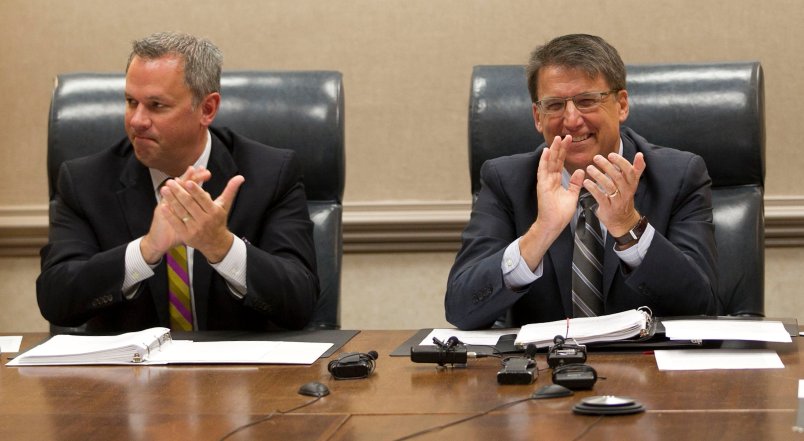RALEIGH, N.C. (AP) — Hecklers who shout down speakers on North Carolina’s college campuses could be punished under a proposal being floated before lawmakers that would make this state the newest battleground over free speech at U.S. universities.
Lt. Gov. Dan Forest is proposing that the state’s 17-campus public university system create a policy that includes punishments for “those who interrupt the free expression of others.” With their annual legislative session opening this week, North Carolina lawmakers are expected to join a half-dozen states that have taken up free-speech legislation for public campuses.
Freedom of speech has become contentious on campuses nationwide. Some students have complained against free expression they say is stoking racial tensions or glossing over sexual misconduct. Others say that amounts to suppressing speech.
Forest’s proposal hasn’t yet been presented as legislation and he declined an Associated Press request for an interview about the details. But he spent months describing his ideas on talk radio and conservative websites.
His main target: hecklers who disrupt public speakers.
Protesters have loudly opposed the North Carolina’s university governing board. They have protested the board’s termination of former University of North Carolina President Tom Ross last year and its hiring of former U.S. Education Secretary Margaret Spellings as his replacement, among other issues. Three people were charged with disorderly conduct and other offenses in January after disrupting a governing board meeting to protest Spellings’ selection.
“If a speaker has been invited by a student group, another in the university community does not have the right to interrupt that speech, shout over the speaker, or otherwise prevent others from listening to the speech,” Forest’s office said in a statement.
Protesting against speakers is nothing new on U.S. campuses.
Demonstrators prevented commencement addresses by former Secretary of State Condoleezza Rice at Rutgers University in New Jersey and Attorney General Eric Holder at the Oklahoma Police Academy in 2014. A student group at Williams College in Massachusetts last fall canceled a speaking invitation for feminism critic Suzanne Venker. University of California-Berkeley students failed to persuade administrators to disinvite liberal comedian Bill Maher as a 2014 commencement speaker amid his complaints about Islam.
Six states have taken up campus speech legislation, but Forest’s proposal would make North Carolina the first to address the so-called “heckler’s veto” versus someone else’s right to speak, said Joe Cohn, policy director of the Foundation for Individual Rights in Education. He compares the idea of curtailing campus hecklers at public meetings to calling police to remove an uninvited trespasser disrupting a wedding party.
“The concept here is if someone is shutting down an event, schools may have an affirmative duty to help protect the integrity of the event and the speakers that are there,” Cohn said. But “there’s some amount of heckling that doesn’t cross the line of shutting something down.”
Lee Rowland, a free speech attorney with the American Civil Liberties Union, said it could be tricky punishing determined hecklers without violating their right to be heard. “Protecting speech sounds really good, but the text of those bills matters immensely,” she noted.
Conflict over the line between free speech and censorship has also overshadowed some major campus protests. At the University of Missouri, a since-fired assistant professor was criticized for calling for “some muscle” to remove a student photographer from covering a public demonstration.
Some colleges have gone so far as to create “free speech zones” that confine expressive activity. Free speech advocates argue the zones curtail freedoms.
“When a college had a free-speech zone, what they’re really saying is that the entire rest of the college is a non-free-speech zone,” said executive director Frank LoMonte of the Student Press Law Center, which advocates for student First Amendment rights.
The lieutenant governor’s ideas follow months of noisy protests, mainly before the state’s university governing board, which oversees 16 universities and one residential math and science high school.
So far, officials with the University of North Carolina system have been shut out of shaping Forest’s proposal, which he also has said should include requiring public universities to remain officially neutral on controversial issues.
Neither Forest nor his staff “have articulated to us directly why he feels such a law is needed or sought our input on a draft bill,” said Joni Worthington, a spokeswoman for the public university system.
___
Follow Emery P. Dalesio on Twitter at http://twitter.com/emerydalesio . His work can be found athttp://bigstory.ap.org/content/emery-p-dalesio .
Copyright 2016 The Associated Press. All rights reserved. This material may not be published, broadcast, rewritten or redistributed.







apparently Mario Savio and the Free Speech movement died in vain… at least in North Carolina… would the appropriate punishment be to make the offender cross dress for 10 days and try to figure out which is the appropriate bathroom?
Sooo…if Trump is invited to spew his hatred, students will need to sit on their hands and muffle their voices?
So, according to Forest, some speech is free-er than others and WILL BE RESPECTED. Any one who has a problem with their “free speech” will have their freedom of speech taken away.
North Carolina: get rid of these aholes, please!!!
Margaret Spelling for the President of NC University? Aw, jeez, you people couldn’t have done much worse. I feel sorry for the staff and the students. The Republicans in NC really are evil sumsabitches – and deserve to be taken down.
I’m trying to figure out just how this would work. If someone is asking a long question that the speaker at an event doesn’t like, and the speaker cuts them off, does the speaker go to jail? If A police officer tells a student to stop drawing a picture of a penis on a free-expression ball, does the officer go up on charges? What if there’s a silent protest, such as a walkout or hundreds of people turning their backs, and the speaker is so upset that they can’t continue?
This seems to be begging for arbitrary and capricious enforcement.